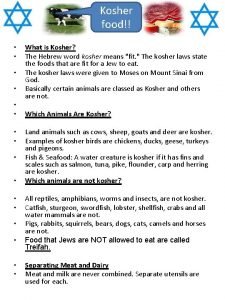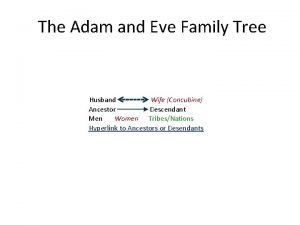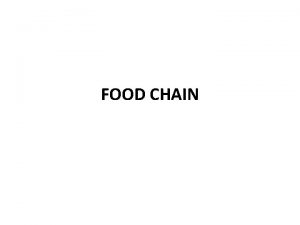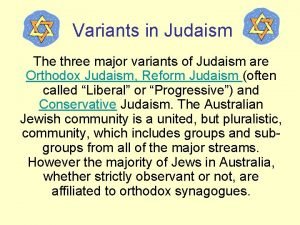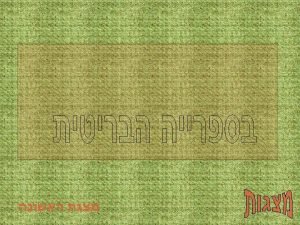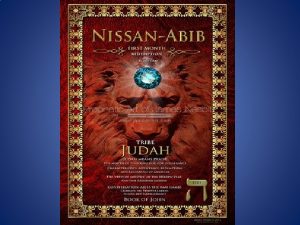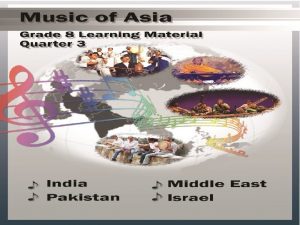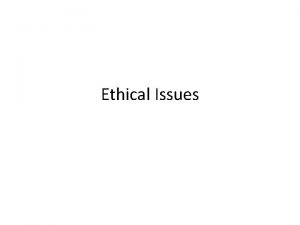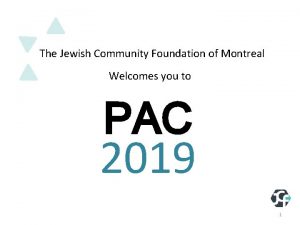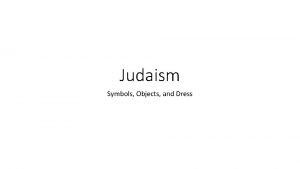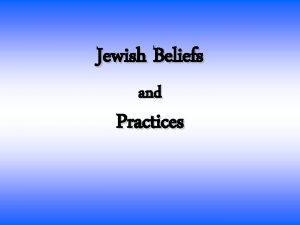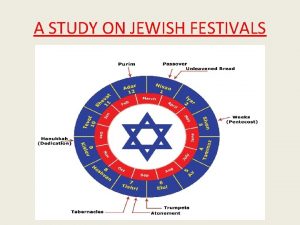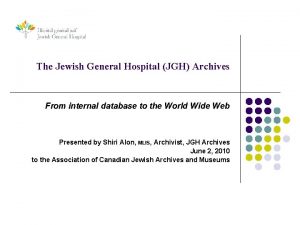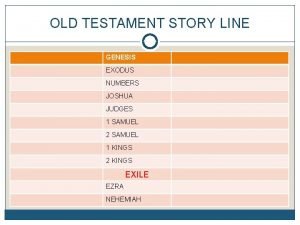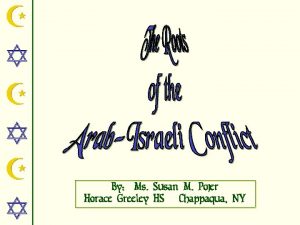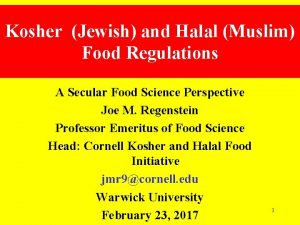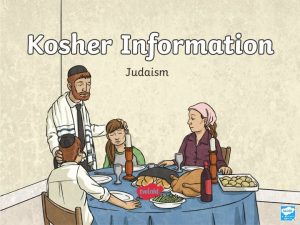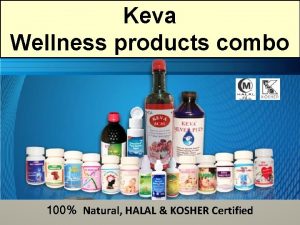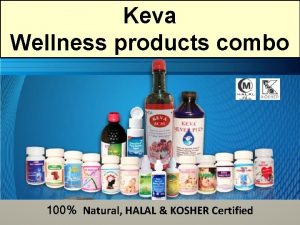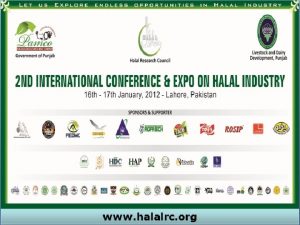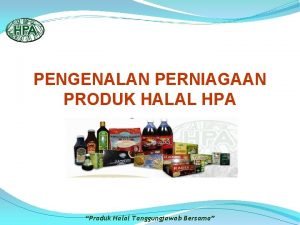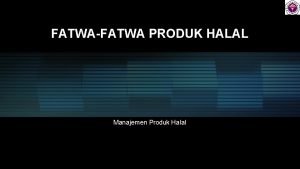Kosher Jewish and Halal Muslim Food Regulations A






































- Slides: 38

Kosher (Jewish) and Halal (Muslim) Food Regulations A Secular Food Science Perspective Joe M. Regenstein Professor Emeritus of Food Science Head: Cornell Kosher and Halal Food Initiative jmr 9@cornell. edu Warwick University February 23, 2017 1

What do the Words Themselves Mean? Kosher = Fit or Proper Treif = Not Kosher Halal = Lawful Haram = Prohibited 2

Initial Clarifications Kosher food is not blessed A product is or is not kosher according to whether it follows the rules not because the rabbi (Jewish religious leader) is there. Essentially the same rules hold for halal except that at the time of slaughter in addition to having to follow the rules, a prayer must be said over each animal. Basically a third party audit! 3

Kosher Laws Generally covers four major areas: 1. The allowed animals Ruminants Split hoof and chew their cud E. g. , cow, sheep, goat, deer, giraffe Traditional domesticated birds But not ostrich, emu, rhea Fish with fins and removable scales Insects: Locust and grasshoppers 4

Kosher -- Part II 2. The prohibition of blood Specific slaughter requirements Inspection of animals after slaughter Deveining, removing blood vessels and some nerve Salting and soaking All products derived from animals must be obtained from kosher animals, e. g. , gelatin, tallow, fat derivatives (emulsifiers, glycerol) 5

Kosher -- Part III 3. Separation of milk and meat Third category: pareve or neutral Makes kosher marked products valuable to many other groups, e. g. , some allergies and other groups like vegetarians 4. Prohibited grains at Passover, a holiday in the spring Brings the kosher laws into the plant kingdom Offers a lot of gluten-free products 6

There are many other laws that are not covered by this limited description. Many of these other laws are very important to the production of the modern kosher food supply. 7

Some Areas of Additional Kosher Laws Jewish cooking Jewish baking Jewish cheese Old (Yashon) versus New (Chodesh) Flour Kitnyos on Passover Orleh – the status of new fruit (under four years old) Grafting Sabbath and Holiday rules (All need to be taken into account when thinking about 8 producing kosher products – easier to do upfront)

Halal 1. Prohibition of specific animals, most specifically PORK but goes beyond food 2. Prohibition of drugs and intoxicants, most specifically drinking ALCOHOL (ethanol, ethyl alcohol) including as an ingredient, such as in vanilla flavor 3. Prohibition of blood: Specific slaughter requirements that are very similar to kosher (can be both simultaneously) 9 4. Prohibition of vermin and filth

How Do You Tell That a Food is Kosher or Halal? Because it says so specifically on the product It has a kosher (hechsher) or halal marking on it The buyer has a “letter/document” from a “recognized” authority attesting to the product’s status 10

Pepperidge Farms Notice that the Hechsher (kosher symbol) is the same size as the net weight statement --- clearly an advertising symbol 11

Heinz Vegetarian Beans Vegetarian Bean: Superior Stamp of Quality 12

Who Provides Kosher Supervision? National supervision agencies Some are communally owned and others are privately owned They have become global Will certify in Turkey Local Community Supervisions Often called a “Vaad” Individual Rabbis 13 Some of these are also global

Examples of a Few Hechshers The Four Major Mainstream Supervisions 14

The Generic K (or H) The Generic K --nobody owns it! Consumer has no idea who is doing the certification Importance of having a trademark 15

Dual Certified Product – Both Kosher and Halal Arabic And Hebrew Many more dual-certified products in the US marketplace today 16

What Do I Mean by “Mainstream Supervision”? The de facto dominant standard for the American Orthodox Jewish Community covering over 90% of kosher products Represented nationally by the “big five” national supervision agencies: OU, Kof-K, Star K, OK, and CRC Many local communal organizations and individual rabbis subscribe to the same standard 17

Mainstream -- Part II The existence of the mainstream is a fact, not a judgment on my part The mainstream does not use exactly the same standards as exist in Israel or Europe but they are close The US standard is continually evolving -- current trends are definitely moving towards stricter standards (An absolute must for ingredients – critical for export to US, Europe, or Israel) 18

The Food Industry View Kosher and Halal are an important part of the food industry worldwide Importance to the industry is not religious but business Many food companies are involved in kosher and/or halal food productions because it is a good business decision! 19

Who Buys Kosher and Halal Foods in the US? Jews (6 million) Muslims (7 million) Vegetarians and Vegans (7 million) Hindu/Buddhist and other eastern religions People with specific allergies Quality conscious consumers Consumers who do not trust the FDA (>inspection) Consequence: 40% of processed foods in the US are kosher 20

Halal Demographics Halal US: Estimate of about 4 -8 million Muslims How many are committed to Halal? Most do not eat pork Many fewer keep Ramadan Worldwide: Over 1. 3 billion Muslims Many countries require Halal certification before products can be imported 21

Beyond the Basic Requirements Kosher transportation required There are kosher “trucking” companies and kosher holding and storage Parallel storage systems in place for kosher and non-kosher oil/shortening and industrial alcohol in the US 22

Equipment Kosherization Often the key to making kosher practical in the “real world” of industry is permitting changing the status of a production line Need for Equipment Kosherization Ability to make non-kosher equipment kosher Makes it possible for kosher/halal to work in the real world 23

Equipment Kosherization Simplified Cold: Simple washing Hot (>120 F, >49 C) Moist: Normal cleaning, 24 hour idle time, flood with boiling water Hot Dry: Heat to glowing 24

The Halal Market Just getting started More developed in other countries although often generic H – not accountable Need for US companies to have certification to be able to export Are also developing a “product marking” system Are seeing more “halal” markets in many urban areas in the US 25

The Major US Symbol to Mark Products as Halal 26

“The intellectual difference of opinion in my community is a blessing. ” The Prophet Muhammad (pbuh) (c. 570 – 632) 27

An American Perspective 1. The importance of freedom of religion 2. The need to respect internal differences within the religion 3. The multiple supervisions provide that diversity consistent with freedom of religion 4. The role of government is to prevent fraud by providing a level playing field: Truth in Labeling and Consumer Right to Know 5. In the area of religion, governments should not be defining the religious standards, which inevitably disrespects some of their citizens 28

Dealing with Europe: Animal Welfare New emphasis on animal welfare Undertones of anti-Semitism and Islamophobia Need to focus on improving animal welfare for the halal slaughter of animals May become a more important issue if and when Turkey tries to become a member of the EU 29

The knife Development of a halal knife that is twice the width of the animal’s neck and straight edged and of a restraining device for holding sheep/goats for smaller slaughterhouses 30

31

A Major Breakthrough A Knife Sharpness Testing Instrument (Anago, Ltd. , Hamilton, New Zealand) 32

Testing Knives Data generated at Cornell, September, 2015, with the help of Peter Dowd from Anago, Ltd. Orange: The knife shown in the picture above (Muslim knife) before specific sharpening Blue: Same knife quickly sharpened by a Jewish slaughter man trained to sharpen knives Green: A well sharpened Jewish slaughter knife owned by the Jewish 33 slaughter man

A proper small-scale restrainer 34

The Temple Grandin Head. Holder Its role is to prevent the head from any movement, which can compromise the slaughter religiously and for animal welfare Must not restrict the access of the slaughterman to the animal Should be partially released just after slaughter, but still keep the animal bleeding After unconsciousness can release fully 35

36

Are These Health Laws? Kosher No Trichinosis in pork as an example No cysts in mummified pork Over 10 day incubation period Halal Yes, but as a “philosophical” set of health concerns and not a modern scientific health system 37

Contact JMR: JMR 9@cornell. edu Copies of this presentation can be made available electronically. For a comprehensive article on kosher and halal, go to the web site: ift. org. Go to on-line journals. Go to Comprehensive Reviews, Vol. 2, Issue 3. For an 80 minute talk, go to cybertower. cornell. edu. (Also hear Dr. Grandin. ) A 2 credit course is being offered by Kansas State University. [We hope to have the article in 38 Chinese later this year. ]
 What is kosher
What is kosher Guds utvalda folk
Guds utvalda folk Animal quarantine department
Animal quarantine department Food safety regulations and standards
Food safety regulations and standards Family tree adam eve
Family tree adam eve Unit 2 food food food
Unit 2 food food food Eltonian pyramid
Eltonian pyramid Jewish variants
Jewish variants Jewish manuscripts
Jewish manuscripts Alan sugar full name
Alan sugar full name Yitzi genack
Yitzi genack Nissan in hebrew
Nissan in hebrew The country which is known for its unique vocals
The country which is known for its unique vocals Jewish chronic disease study
Jewish chronic disease study Three jewish feasts
Three jewish feasts Jewish community foundation montreal
Jewish community foundation montreal Samuel barber jewish
Samuel barber jewish Marc brown
Marc brown Jewish symbols
Jewish symbols Jewish leadership council
Jewish leadership council Judaism branches
Judaism branches Jewish place of worship
Jewish place of worship Hebrew festivals
Hebrew festivals Jewish translation
Jewish translation Microcalligraphy
Microcalligraphy Nhannukah
Nhannukah Jewish buddha
Jewish buddha Jewish general hospital archives
Jewish general hospital archives Jewish ear
Jewish ear Jewish gen
Jewish gen Old testament jewish temple layout
Old testament jewish temple layout Misha collins childhood
Misha collins childhood The impact of pseudoscientific ideas of race
The impact of pseudoscientific ideas of race Jewish gen
Jewish gen Michael polansky jewish
Michael polansky jewish Nakuset jewish
Nakuset jewish Chappaqua jewish population
Chappaqua jewish population Poster kebijakan halal
Poster kebijakan halal Halal training program
Halal training program
